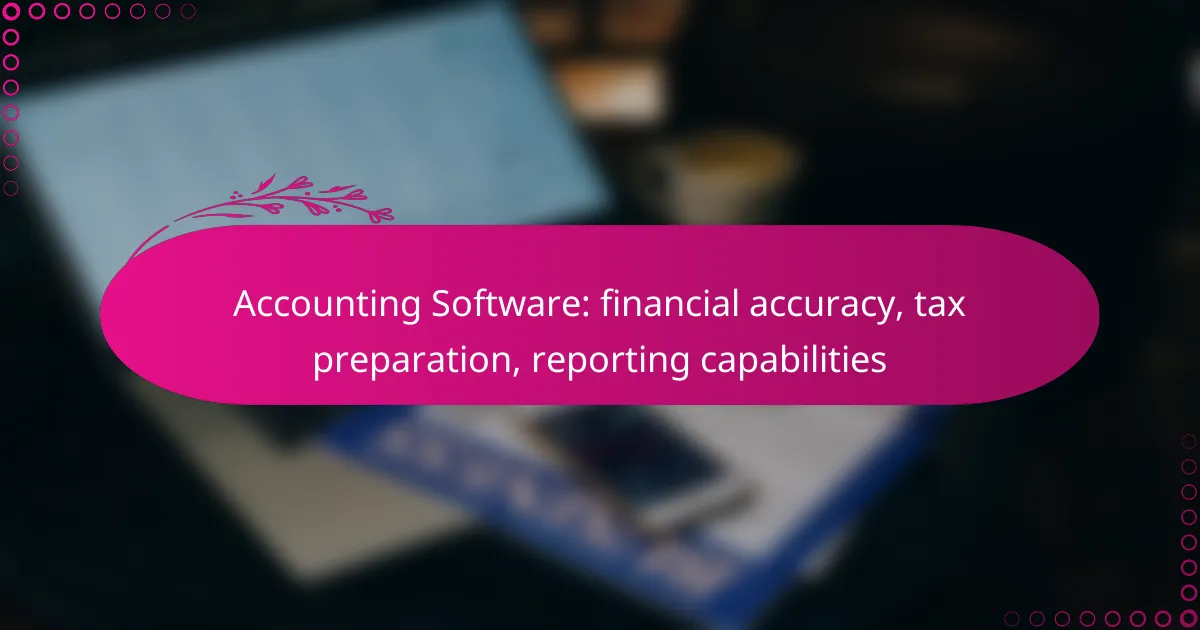For businesses in Canada, choosing the right accounting software is crucial for achieving financial accuracy and compliance. These tools not only facilitate efficient tax preparation by automating calculations but also offer robust reporting capabilities, allowing for real-time insights and customized dashboards. By streamlining these processes, businesses can reduce errors and make informed financial decisions with confidence.
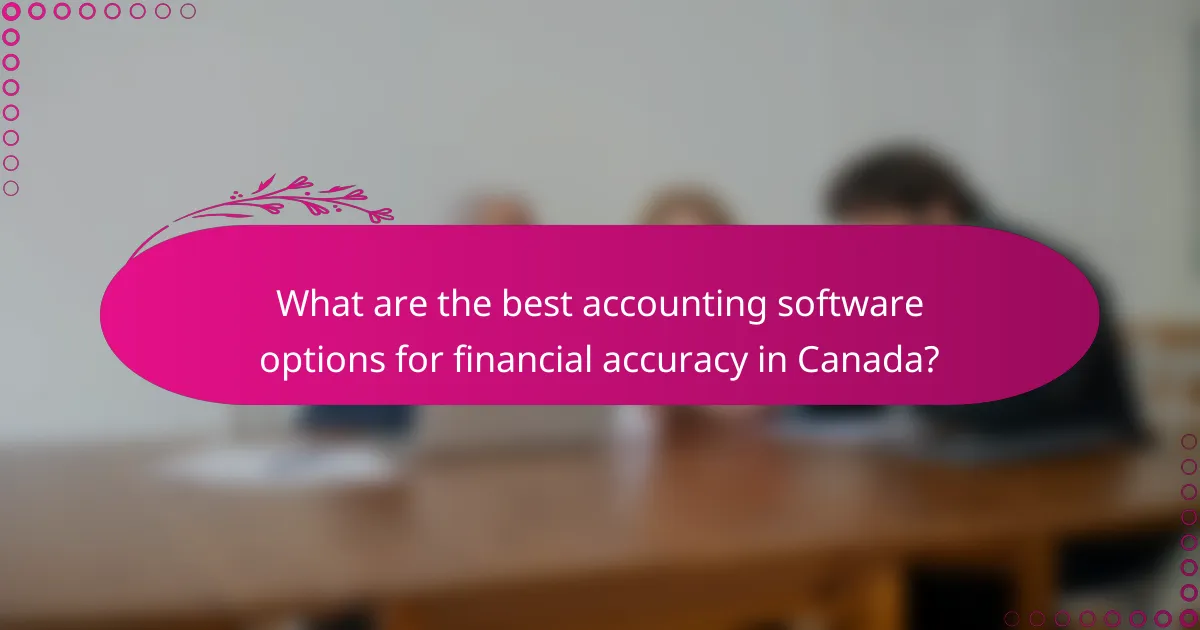
What are the best accounting software options for financial accuracy in Canada?
For businesses in Canada seeking financial accuracy, several accounting software options stand out. These tools not only streamline financial management but also enhance tax preparation and reporting capabilities, ensuring compliance with Canadian regulations.
QuickBooks Online
QuickBooks Online is a widely used accounting software that offers robust features for financial accuracy. It allows users to track income and expenses, manage invoices, and generate financial reports that comply with Canadian tax laws.
Its user-friendly interface and cloud-based access make it suitable for small to medium-sized businesses. Additionally, QuickBooks Online integrates with various banking institutions, simplifying reconciliation processes.
Xero
Xero is another strong contender for Canadian businesses, known for its real-time financial reporting and collaboration features. It provides tools for invoicing, expense tracking, and bank reconciliation, all tailored to meet Canadian accounting standards.
With Xero, users can easily share access with accountants and team members, enhancing collaboration. Its mobile app also allows for on-the-go management of finances, making it a flexible choice for busy entrepreneurs.
FreshBooks
FreshBooks is particularly favored by freelancers and small business owners for its simplicity and focus on invoicing. It offers features that ensure financial accuracy, such as expense tracking and time tracking, which are essential for accurate billing.
FreshBooks also provides customizable reports that help users understand their financial health. Its user-friendly design makes it easy for those without an accounting background to manage their finances effectively.
Sage 50cloud
Sage 50cloud combines desktop software with cloud capabilities, offering a comprehensive solution for financial management. It is designed for small to medium-sized businesses and provides advanced features like inventory management and payroll processing.
This software ensures financial accuracy through detailed reporting and compliance with Canadian tax regulations. However, it may require a steeper learning curve compared to other options, making training essential for new users.
Wave Accounting
Wave Accounting is a free accounting software option that provides essential features for small businesses. It includes tools for invoicing, expense tracking, and financial reporting, making it a cost-effective choice for startups.
While Wave offers solid functionality for financial accuracy, users should be aware that its free model may come with limitations in customer support and advanced features. Nevertheless, it remains a popular choice for those looking to manage their finances without incurring software costs.
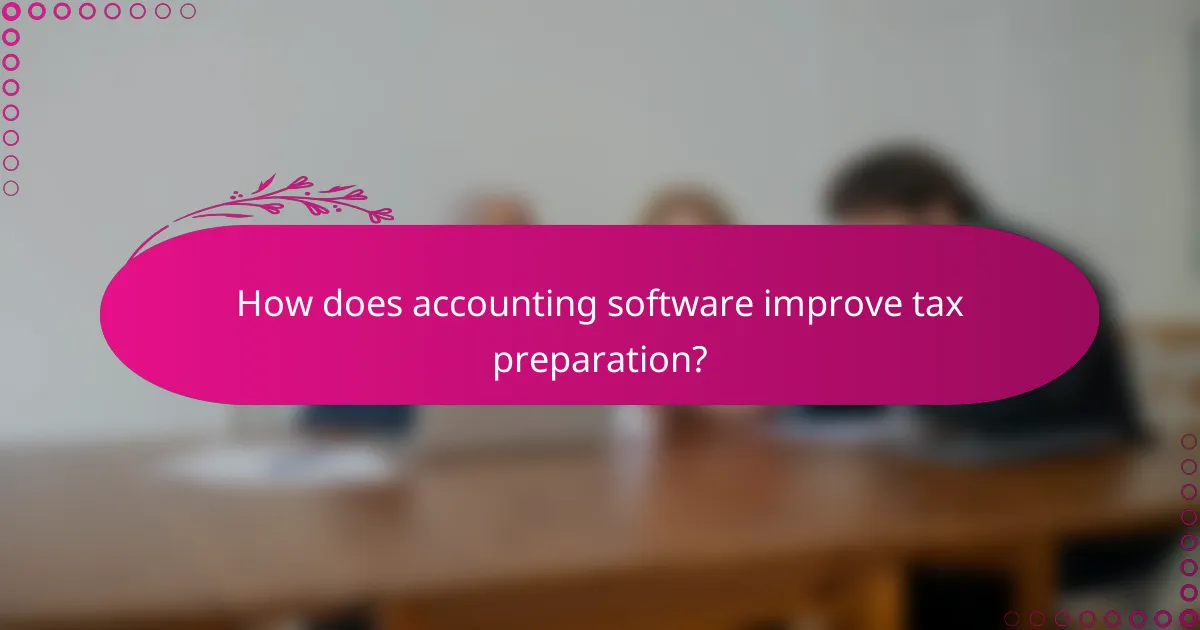
How does accounting software improve tax preparation?
Accounting software enhances tax preparation by automating calculations, ensuring accuracy, and streamlining reporting processes. This reduces the risk of errors and saves time, making it easier for businesses to comply with tax regulations.
Automated tax calculations
Automated tax calculations simplify the process of determining tax liabilities by using built-in algorithms that apply the latest tax rates and regulations. This feature minimizes manual entry errors and ensures that calculations are up to date with current tax laws.
For instance, if your business earns revenue in multiple states, the software can automatically calculate the appropriate state taxes based on the location of sales. This saves time and reduces the likelihood of costly mistakes.
Integration with CRA
Many accounting software solutions offer integration with the Canada Revenue Agency (CRA), allowing for seamless data transfer and compliance with Canadian tax regulations. This integration facilitates direct filing of tax returns and ensures that all necessary forms are completed correctly.
By linking your accounting software with CRA, you can easily access your tax information and track your filing status, which helps in maintaining accurate records and avoiding penalties for late submissions.
Tax reporting features
Tax reporting features in accounting software provide detailed insights into your financial activities, making it easier to prepare for tax season. These features often include customizable reports that highlight income, expenses, and deductions relevant to tax filings.
For example, you can generate a profit and loss statement or a balance sheet to assess your financial position before filing taxes. This allows you to identify potential deductions and credits, ultimately reducing your overall tax burden.
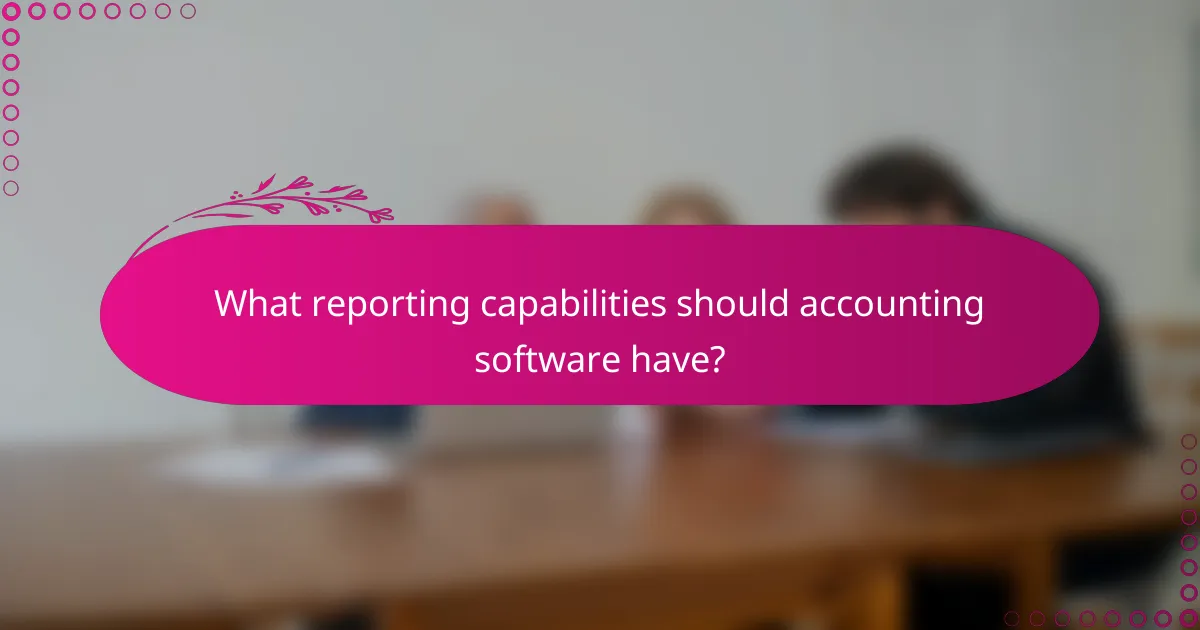
What reporting capabilities should accounting software have?
Accounting software should have robust reporting capabilities that allow users to generate real-time financial insights, customize dashboards, and ensure compliance with regulations. These features enable businesses to make informed decisions and maintain accurate financial records.
Real-time financial reporting
Real-time financial reporting enables businesses to access up-to-date financial data instantly. This capability is crucial for monitoring cash flow, tracking expenses, and assessing profitability. Look for software that updates financial statements automatically as transactions occur, providing a clear picture of your financial health.
Consider tools that allow for drill-down capabilities, letting you explore data at various levels, from overall performance to individual transactions. This can help identify trends and anomalies quickly, facilitating timely decision-making.
Customizable dashboards
Customizable dashboards allow users to tailor their financial reporting views according to specific needs and preferences. This feature enhances usability by presenting key performance indicators (KPIs) and metrics that matter most to your business at a glance.
When selecting accounting software, ensure it offers flexibility in dashboard design, enabling you to add or remove widgets, charts, and graphs easily. This adaptability can help you focus on critical data points, improving overall efficiency in financial management.
Compliance reporting
Compliance reporting is essential for ensuring that your business adheres to local regulations and tax laws. Accounting software should facilitate the generation of reports that meet legal requirements, such as tax filings and financial disclosures.
Choose software that is updated regularly to reflect changes in regulations, ensuring your reports are always compliant. Additionally, consider features that automate compliance checks, reducing the risk of errors and potential penalties.
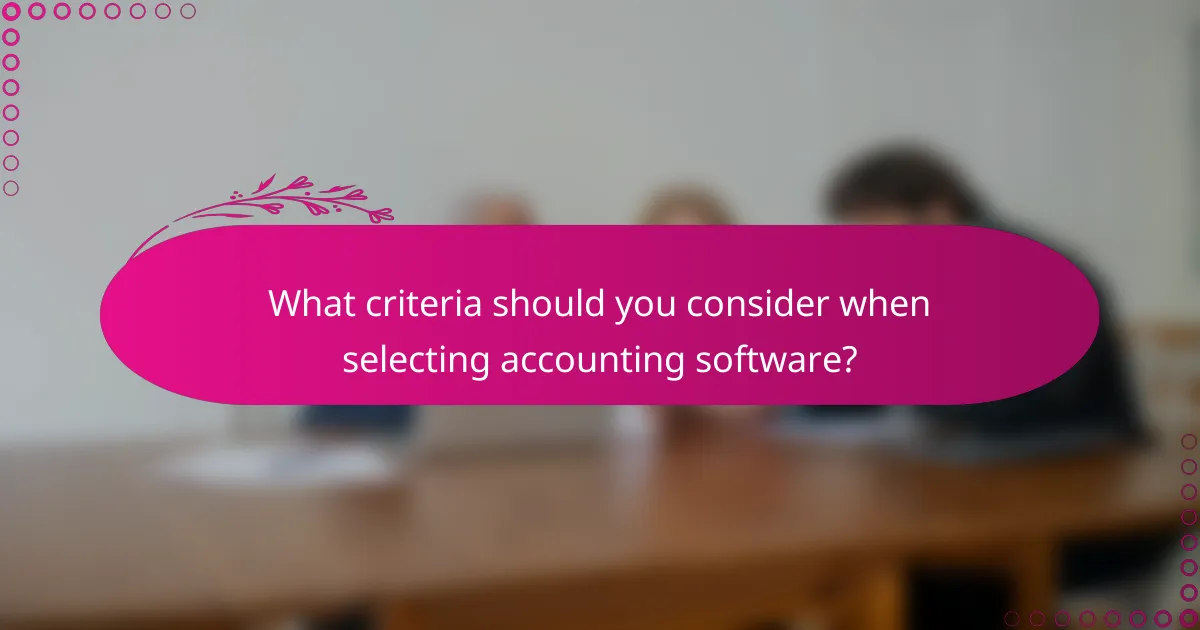
What criteria should you consider when selecting accounting software?
When selecting accounting software, prioritize features that enhance financial accuracy, streamline tax preparation, and improve reporting capabilities. Evaluating scalability, integration with existing tools, and user-friendliness will help ensure the software meets your business needs both now and in the future.
Scalability for business growth
Scalability is crucial for accounting software as it determines how well the system can adapt to your business’s growth. Look for software that can handle increasing transaction volumes and additional users without significant performance issues.
Consider solutions that offer tiered pricing plans or modular features, allowing you to add functionalities as your business expands. This approach can help manage costs while ensuring you have the necessary tools to support growth.
Integration with existing tools
Choosing accounting software that integrates seamlessly with your current tools can enhance efficiency and reduce manual data entry. Check if the software supports popular platforms like CRM systems, payroll services, and e-commerce solutions.
Prioritize software with open APIs or pre-built integrations to facilitate data flow between systems. This can save time and minimize errors, especially during tax preparation and reporting processes.
User-friendly interface
A user-friendly interface is essential for ensuring that your team can effectively utilize the accounting software. Look for intuitive designs that simplify navigation and reduce the learning curve for new users.
Consider software that offers customizable dashboards and easy access to key features. A well-designed interface can enhance productivity and encourage consistent use, ultimately leading to better financial management.
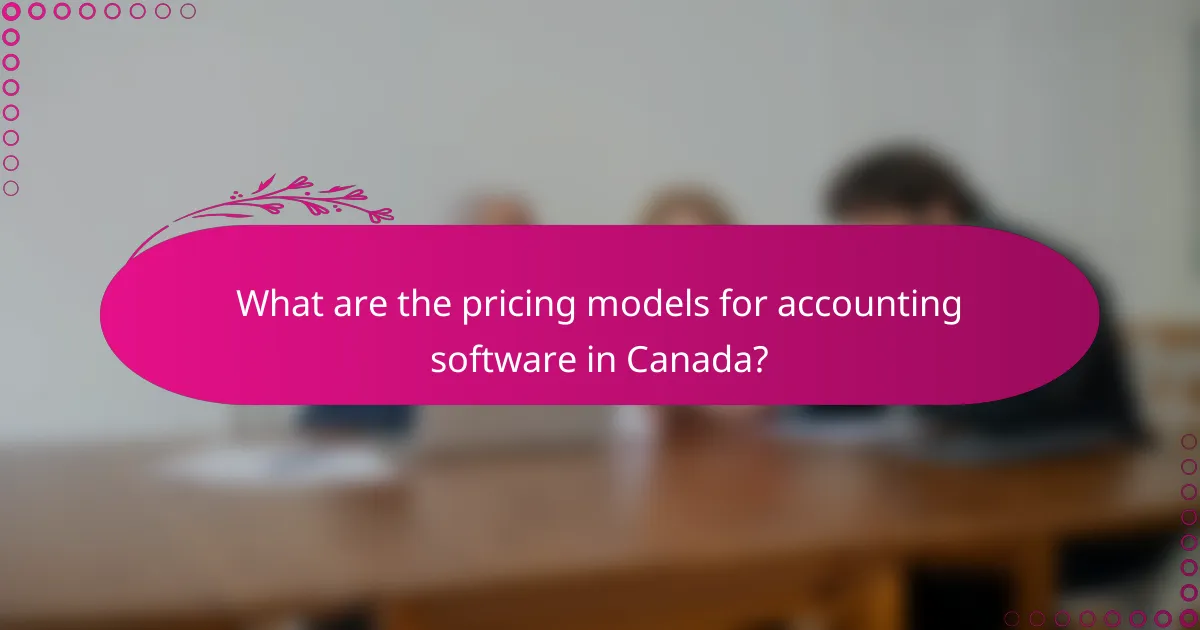
What are the pricing models for accounting software in Canada?
In Canada, accounting software typically offers various pricing models, including monthly subscriptions, one-time purchases, and free trials or freemium options. Understanding these models can help businesses choose the most cost-effective solution for their financial management needs.
Monthly subscription fees
Monthly subscription fees for accounting software in Canada usually range from CAD 10 to CAD 100, depending on the features and number of users. This model allows businesses to pay for the software on a recurring basis, providing flexibility and access to updates without large upfront costs.
When considering monthly subscriptions, evaluate the features included at each pricing tier. Some software may offer basic functionalities at lower rates, while advanced features like tax preparation and reporting capabilities may require higher-tier plans.
One-time purchase options
One-time purchase options for accounting software typically cost between CAD 200 and CAD 1,000. This model allows users to buy the software outright, which can be more economical in the long run for businesses that prefer not to deal with ongoing fees.
However, one-time purchases may not include regular updates or customer support, so it’s essential to factor in potential additional costs for upgrades or maintenance. Ensure the software meets your long-term needs before committing to this model.
Free trials and freemium models
Many accounting software providers in Canada offer free trials or freemium models, allowing users to test the software before making a financial commitment. Free trials typically last from 14 to 30 days, giving businesses a chance to explore features and usability.
Freemium models provide basic functionalities at no cost, with the option to upgrade for advanced features. While this can be a great way to start, be cautious of limitations that may hinder your accounting processes as your business grows.
